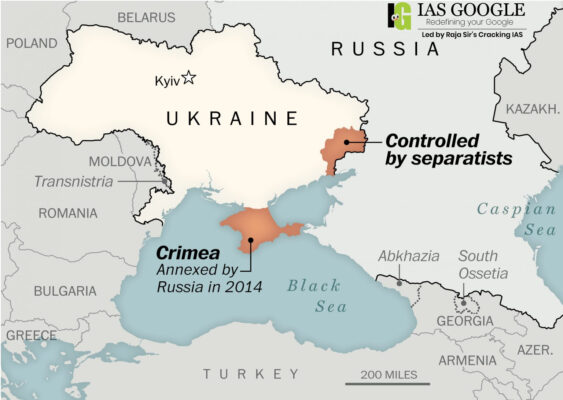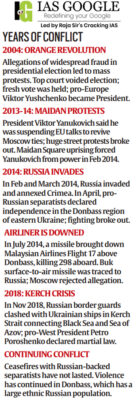- Home
- Prelims
- Mains
- Current Affairs
- Study Materials
- Test Series
How does the Ukraine crisis affect India?.
Read More - https://www.vox.com/2014/9/3/18088560/ukraine-everything-you-need-to-know


-
- Ukraine and Russia share hundreds of years of cultural, linguistic and familial links.
- For many in Russia and in the ethnically Russian parts of Ukraine, the shared heritage of the countries is an emotional issue that has been exploited for electoral and military purposes.
- As part of the Soviet Union, Ukraine was the second-most powerful Soviet republic after Russia, and was crucial strategically, economically and culturally.
- Ukraine and Russia share hundreds of years of cultural, linguistic and familial links.

- Cause of Conflict:

-
- Balance of Power: Ever since Ukraine split from the Soviet Union, both Russia and the West have vied for greater influence in the country in order to keep the balance of power in the region in their favour.
- Buffer Zone for Western Countries: For the US and the European Union, Ukraine is a crucial buffer between Russia and the West.
- As tensions with Russia rise, the US and the EU are increasingly determined to keep Ukraine away from Russian control.
- Russian Interest in Black Sea: The unique geography of the Black Sea region confers several geopolitical advantages to Russia.
- Firstly, it is an important crossroads and strategic intersection for the entire region.
- Access to the Black Sea is vital for all littoral and neighboring states, and greatly enhances the projection of power into several adjacent regions.
- Secondly, the region is an important transit corridor for goods and energy.
- Protests in Ukraine:
- Euromaidan Movement: Euromaidan (European Square) was a wave of demonstrations and civil unrest in Ukraine, which began in November 2013 with public protests in Maidan Nezalezhnosti ("Independence Square") in Kyiv, Ukraine.
- The protests were sparked by the Ukrainian government's decision to suspend the signing of an association agreement with the European Union, instead choosing closer ties to Russia and the Eurasian Economic Union.
- Euromaidan Movement: Euromaidan (European Square) was a wave of demonstrations and civil unrest in Ukraine, which began in November 2013 with public protests in Maidan Nezalezhnosti ("Independence Square") in Kyiv, Ukraine.
- Separatist Movement: The Donbass region (the Donetsk and Luhansk regions) of eastern Ukraine has been facing a pro-Russian separatist movement since 2014.
- According to the Ukrainian government, the movement is actively supported by the Russian government and Russian paramilitaries make up between 15% to 80% of the separatists fighting against the Ukraine government.
- Invasion of Crimea:
- Russia seized Crimea from Ukraine in what was the first time a European country annexed territory from another country since World War-2.
- The annexation of Crimea from Ukraine followed a Russian military intervention in Crimea that took place in the aftermath of the 2014 Ukrainian revolution and was part of wider unrest across southern and eastern Ukraine.
- The invasion and subsequent annexation of Crimea have given Russia a maritime upperhand in the region.
- Ukrain’s NATO Membership: Ukraine has urged the North Atlantic Treaty Organization (NATO) to speed up his country’s membership in the alliance.
- Russia has declared such a move a “red line”, and worried about the consequences of the US-led military alliances expanding right up to its doorstep.
- The Black Sea is bordered by Bulgaria, Georgia, Romania, Russia, Turkey and Ukraine. All these countries are NATO countries.
- Due to this faceoff between NATO countries and Russia, the Balck sea is a region of strategic importance & a potential maritime flashpoint.
- Minsk Agreements:
- Minsk I: Ukraine and the Russian-backed separatists agreed a 12-poin t ceasefire deal in the capital of Belarus in September 2014.
- Its provisions included prisoner exchanges, deliveries of humanitarian aid and the withdrawal of heavy weapons.
- The agreement quickly broke down, with violations by both sides.
- Minsk II: In 2015, an open conflict was averted after the ‘Minsk II’ peace agreement was signed, under the mediation of France and Germany.
- It was designed to end the fighting in the rebel regions and hand over the border to Ukraine’s national troops.
- It was signed by Representatives of Russia, Ukraine, the Organisation for Security and Cooperation in Europe (OSCE) and the leaders of two pro-Russian separatist regions.
- OSCE is the world's largest security-oriented intergovernmental organisation. Its mandate includes issues such as arms control, promotion of human rights, freedom of the press, and fair elections.
- Minsk I: Ukraine and the Russian-backed separatists agreed a 12-poin t ceasefire deal in the capital of Belarus in September 2014.
- Russia wants assurances from the United States that Ukraine will not be admitted to NATO. The United States, on the other hand, is unwilling to provide such assurances.
- This has resulted in a standoff between the two countries, with tens of thousands of Russian troops poised to invade Ukraine.
- In order to obtain sanctions relief and other concessions from the West, Russia is keeping tensions high near the Ukraine border.
- Any military action by the United States or European Union against Russia would trigger a major global crisis and has not been mooted by any of the countries engaged thus far.









 Latest News
Latest News
 General Studies
General Studies